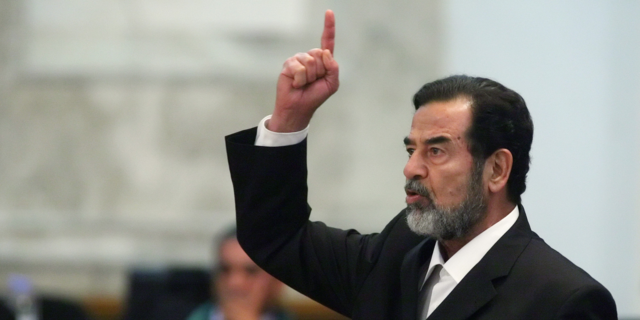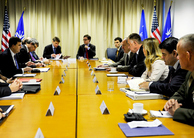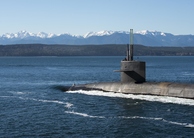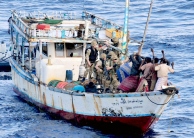|
National Security (tagged articles)
The keyword National Security is tagged in the following 22 articles.
2021, Vol. 13 No. 10
This paper assesses the political preferences and ideologies of the Trump administration and how they influenced framing issues in a way that has underestimated the threats of right-wing militia groups in the United States. President Trump and officials... Read Article »
2019, Vol. 11 No. 02
In recent years, climate change has been increasingly framed as a security issue, with some theorists going so far as to call it the most important security issue of the 21st century. This paper will examine the relationship between climate change... Read Article »
2016, Vol. 8 No. 11
In the early 1990s, two terrorist organizations, Hamas and the Fatah-led Palestinian Liberation Organization (PLO), were using terrorism to promote their political plight of Palestinian self-determination. Although both organizations vowed to use... Read Article »
2016, Vol. 9 No. 2
Ambassador Paul Bremer of the Coalition Provisional Authority, America's interim government between Saddam's fall and the independent establishment of a new Iraqi government, issued two specific orders during his term which combined to create a... Read Article »
2016, Vol. 9 No. 2
Bataclan. San Bernadino. One need not read any further to understand how radicalization is crucial to counterterrorism and National Security. Some states have implemented counter-radicalization strategies to cull terrorism at its root. These tactics... Read Article »
2016, Vol. 2015/2016 No. 2
Cyber security is a compelling problem for scholars of International Politics. Internet technology is so thoroughly integrated into civil society, commerce, governance, critical infrastructures, intelligence collection and law enforcement that the... Read Article »
2016, Vol. 2015/2016 No. 2
In Cyber War Will Not Take Place1, Thomas Rid develops his argument on the concept of "cyberwar", previously formulated in an article of the same name2 published in January 2012. His chief point is that "cyber war has never happened in the past,... Read Article »
2016, Vol. 2015/2016 No. 2
Cybersecurity is presented in the growing literature on the subject as an essentially "slippery" object for state security.1 The Internet puts a lot of stress on the conventional conception of state security as the insurance of the state's survival... Read Article »
2014, Vol. 8 No. 1
This paper analyzes the grey market for cyber materials by evaluating the current nature of transactions within the market. This paper claims that vendors ought to be required to disclose information (to companies) on the vulnerabilities, exploits... Read Article »
2014, Vol. 8 No. 1
The formation and expansion of the U.S. Africa Command (USAFRICOM) signals the increasing strategic importance of Africa to U.S. security interests, especially in light of the 2014 U.S.-Africa Leaders Summit on strategic relations. USAFRICOM is... Read Article »
2014, Vol. 8 No. 1
Legitimate whistleblower or traitor? While the public continues to debate which of these titles most aptly describes former National Security Agency (NSA) employee Edward Snowden, a movie set to start filming in January 2015 attests to the continuing... Read Article »
2014, Vol. 2013/2014 No. 1
There is a widespread belief that as societies and governments become increasingly reliant upon information technology, they in turn are becoming more vulnerable to a whole range of cyber-threats.1 Whether these dangers are capable of generating... Read Article »
2013, Vol. 4 No. 1
With nuclear proliferation a major threat to inter National Security, this study examines the factors that led three countries to denuclearize by applying Scott Sagan's three models: security, domestic politics, and norms. Rather than only observing... Read Article »
2011, Vol. 3 No. 09
Since the early 1990s, rampant piracy off the coast of Somalia has become a major issue for global trade and security, prompting strong responses from the international community. In 2010 alone, the collective cost of ransom money, military protection... Read Article »
2011, Vol. 3 No. 08
Somalia is home to roughly 9 million people, the overwhelming majority of whom are ethnic Somalis (UN Statistics Division 2010). The country has been plagued with conflict and disorder beginning just years after it attained independence. Following... Read Article »
2011, Vol. 3 No. 03
It is widely recognized that state security is no longer contingent upon a balance of power or the threat of conquering states, but global stability is now instead jeopardized by weak or fragile states. Fragile states represent chaos, disorder,... Read Article »
2010, Vol. 4 No. 1
Supporters of “green-badgers”—the nickname given to contractors working inside the American intelligence community—argue that after 9/11 the United States needed a more flexible labor pool of intelligence professionals to... Read Article »
2010, Vol. 2 No. 07
The United States presidency is a complex role, encompassing both domestic and foreign policy responsibilities. As a major world power, the United States has a large role in the realm of foreign policy, and it is the duty of the president to assume... Read Article »
2010, Vol. 3 No. 2
Even before his inauguration, President Barack Obama made it clear that he believed torture was morally reprehensible and promised that under his administration the U.S. would no longer practice torture.1 Accordingly, on April 16th, 2009 Mr. Obama... Read Article »
2008, Vol. 1 No. 2
The United Nations Security Council is the most important organ in the United Nations, charged with determining “the existence of any threat to peace, breach of peace, or act of aggression” and to “maintain or restore international... Read Article »
1997, Vol. 1996/1997 No. 2
Threats to inter National Security may assume many guises all of which deserve thorough analysis. Indeed, as we approach the new millennium, there are a multitude of ‘morbid symptoms’ which threaten to thwart any attempts at achieving... Read Article »
1997, Vol. 1996/1997 No. 2
Nuclear weapons were first used in anger during the Second World War against the Japanese. The Horishima and Nagasaki experience left nobody in any doubt that nuclear weapons were unique. Never before had so much destruction been meted out so... Read Article »
Expedited Article Review
Submit an article and get a decision fast.
If you need a fast decision, INQUIRIES Journal offers expedited processing of your submission for a small fee. Depending on the expedited review option you choose, you can receive a decision in as few as 5-days.
In addition to a shorter review period, the fee supports the journal's continued operation and open-access publishing model. Standard submissions are always free. Submit Now » - Submit an Article to Inquiries Journal -
|





























